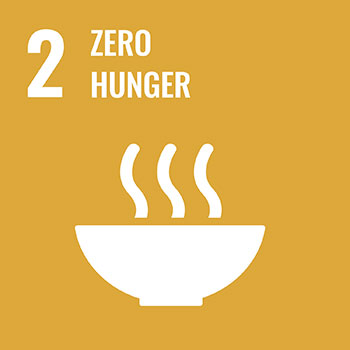SDG 2: Zero Hunger
End hunger, achieve food security and improved nutrition and promote sustainable agriculture.

Through research, community engagement, sustainable food practices, academic programs, global outreach and advocacy, Laurier demonstrates our commitment to a world where everyone has access to nutritious and sustainable food sources.
See some of the work that Laurier completed in 2022 to advance SDG 2.
Laurier hosted the 13th annual Empty Bowls fundraiser to raise funds for The Food Bank of Waterloo Region and awareness about hunger in the community. The fundraiser was presented by Laurier’s Robert Langen Art Gallery, in partnership with the Food Bank of Waterloo Region and Waterloo Potters’ Workshop.
Through Laurier’s unique partnership with the Government of the Northwest Territories, Assistant Professor Andrew Spring and his team have been working with the Sambaa K’e community for years. A Laurier MBA student was invited by the First Nation band to come and study ways to enhance their local food security.
As more than 10,000 delegates from 196 countries gathered to create biodiversity targets for the next decade at COP15 in Montreal, Laurier scholars did their part to help ensure a biologically diverse future for the planet.
Explore the work that our research centres do toward ending poverty.
The Laurier Centre for Sustainable Food Systems (LCSFS) connects researchers and community partners engaged in sustainable food systems change. It creates opportunities for citizens, practitioners, policy-makers, private enterprise and academics to work together to imagine and foster food systems that are fair, healthy, ecologically regenerative, culturally appropriate, prosperous and inclusive. Using food as a lever for positive change, LCSFS enables meaningful collaboration among people across institutions, sectors and disciplines to support community-driven research, innovative knowledge sharing, and the development of community resources and more sustainable food system policy.
Learn more about Laurier's initiatives in 2022 that helped advance SDG 2.
As a Graduate Student Association-led food security initiative, The Mini Market is a pay-what-you-can grocery store that stocks perishable and non-perishable foods, Heat and Eat prepared meals, as well as other essentials like hygiene products. Students pay what they can afford based on their budget, ranging from full price to no charge for a basket of groceries. Staff and faculty pay full price for their items.
In an effort to address food insecurity among students, Martin Luther University College and the Laurier Students’ Public Interest Research Group run the Free Weekly Distro, a food distribution program each Thursday on both Waterloo and Brantford campuses. The program provides fresh and non-perishable food items as well as other essential items to Laurier students.
The Laurier Students' Union runs a Food Bank which aims to help undergraduate students dealing with food insecurity. Food insecurity refers to the inability to acquire or consume a balanced diet that is of adequate quality and quantity. This can create challenges sustaining one’s well-being, physically, mentally, and academically.
Established in 2019, the UNESCO Chair on Food, Biodiversity and Sustainability Studies is a platform for change, using food systems as a lens to work toward biodiversity protection, enhanced community resilience in the face of climate change, increased opportunities for marginalized groups, improved food security and enhanced community well-being. The UNESCO Chair network is led by the inaugural chairholder, Alison Blay-Palmer, and jointly hosted by Laurier and the Balsillie School of International Affairs. It is affiliated with the Laurier Centre for Sustainable Food Systems.